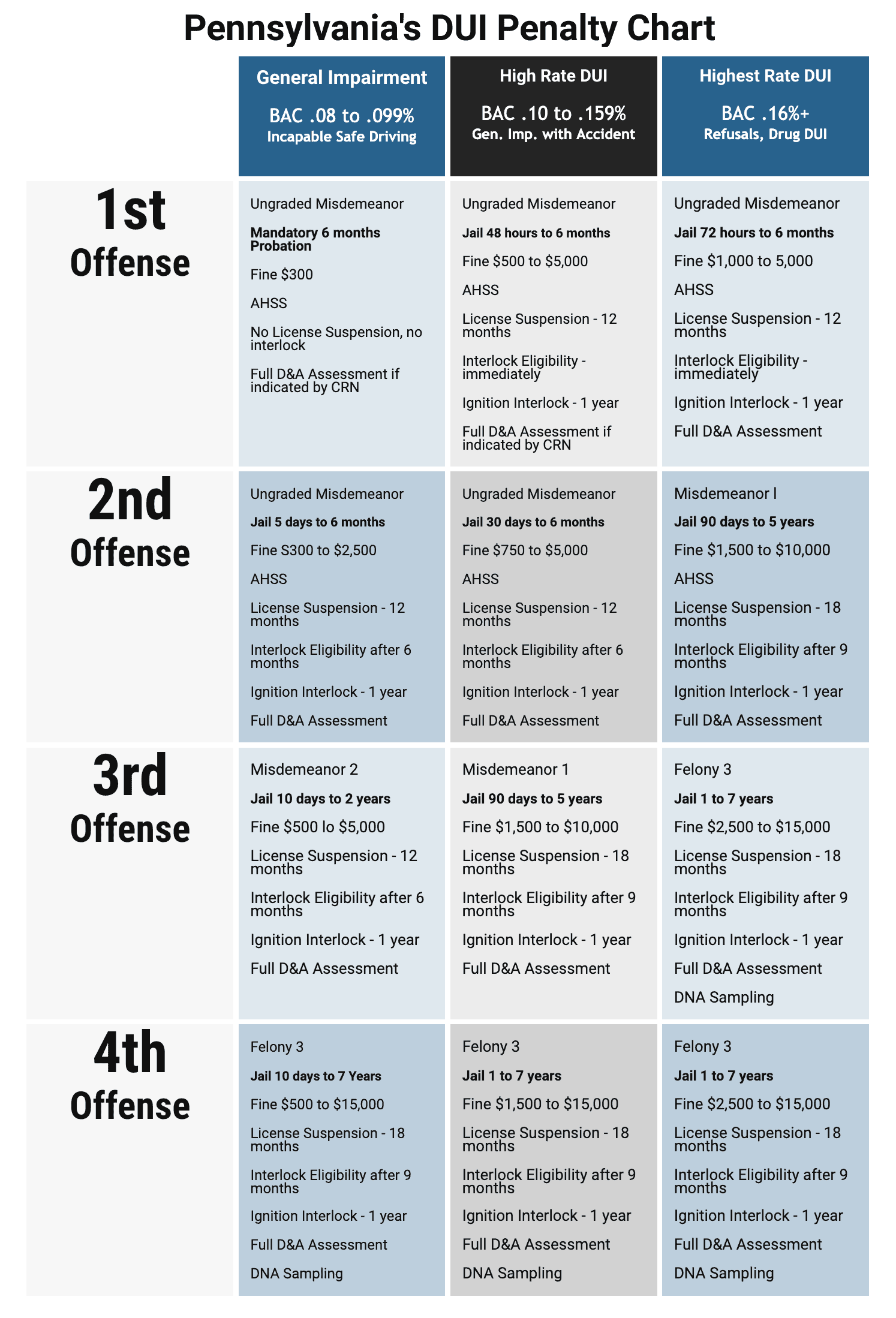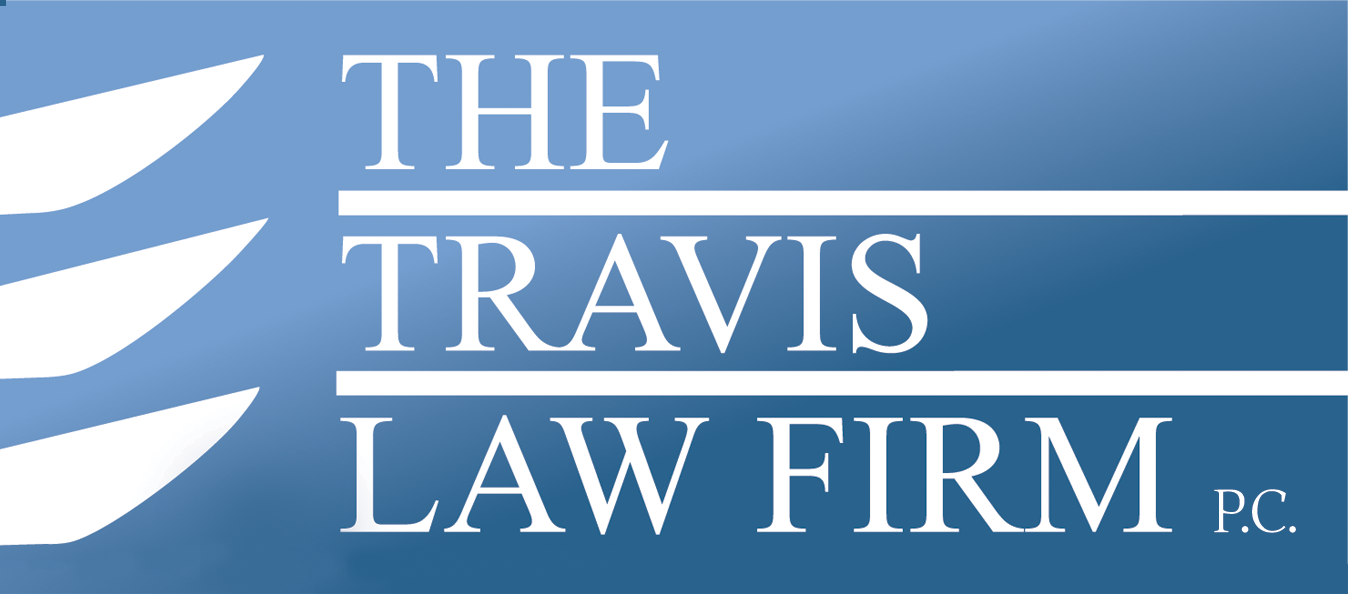PENNSYLVANIA'S DUI PENALTY CHART
What Penalties Will You Face For A DUI Conviction?
Penalties for a DUI conviction are outlined in Pennsylvania’s statutes (state laws). Primary sentencing depends upon whether the DUI is a first offense or a multiple offense (repeat offender). The court will examine how many other DUIs you’ve had within the 10 years prior to your current DUI charge. Some hard-line judges may go farther back and consider a DUI conviction older than 10 years.
Other Considerations Involved In Your Sentencing
Aside from the number of prior DUIs you have, there are several other factors taken into consideration during your sentencing.
Those factors include (but are not limited to):
- Your Blood Alcohol Content (BAC) level.
If the reading was especially high, or you refused to take the test, this will effect your sentence. - Any Other Aggravating Factors.
Were you involved in a car accident? Did you resist arrest or fight with the police? - Your Criminal Record.
If you have prior criminal convictions, even if they are not DUI related, you have a criminal record. This can also effect your sentence.

Please Note: Ungraded Misdemeanors do not permit jury trials.
Legislative Summary of Act 153 of 2018
Title 75 Section 1505 - Learner's Permit
Adds Sub-Section (b) (4) which adds a requirement that the otherwise qualified licensed driver accompanying the person driving on a learner's permit may not be "manifestly under the influence of alcohol or drugs to the degree that the person may endanger themselves or others."
Title 75 Section 1543 (b) - Driving During Suspension - DUI Related
Current version of Section 1543(bX1) provides only for a sentence of 60 to 90 days in prison and a $500. Act 153 amends this section by providing scaled penalties based on the number of 15a3@)(1) violations. Specifically, the Act provides the for the following penalties under 15a3@)
(1): (i) A first violation shall be a slrmmary offense with a mandatory fine of $500 and imprisonment for not less than 60 no more than 90 days.
(ii) A second violation shall be a summary offense with a mandatory fine of fine of $1,000 and imprisonment for not less that 90 days.
(iii) A third or subsequent violation shall constitute a misdemeanor of the third degree with a mandatory fine of $2,500 and to undergo imprisonment of not less than 6 months.
(Essentially a mandatory 6 to 12 months jail sentence and mandatory fine of $2,500.) There is no look back for violations of 1543(b), so this is a lifetime accumulation.
Title 75 Section 3732 - Homicide by Vehicle
Act 153 amends sentencing portions of the this offense to provide that, in addition to any other penalty provided by law, a person convicted of Homicide by Vehicle may be sentenced to an additional 5 years confinement if also convicted of one of the following arising out of the same incident:
Section 1501 Drivers Required to be Licensed Section
1543 Driving Under Suspension Section
3316 (Relating to prohibited text-based communication.)
Section 3325 (Relating to Duty of Driver on approach of Emergency Vehicle)
Section 3377 (Relating to Duty of a Driver in an Emergency Response Area)
The prosecution must indicate intent to proceed under this section in the indictment or information when commencing the prosecution.
The Commission on Sentencing was also directed to establish an enhancement for the offense of Homicide by Vehicle when the violation occurred in an active work zone or was convicted of one of 1 50 I , 1543, 3316,3325 and 3377 .
Title 75 Section 3732.1 - Aggravated Assault by Vehicle
Act 153 amends sentencing portions of this offense to provide that, in addition to any other penalty provided by law, a person convicted of Aggravated Assault by Vehicle may be sentenced to an additional2 years confinement if also convicted of one of the following arising out of the same incident:
Section 1501 Drivers Required to be Licensed
Section 1543 Driving Under Suspension
Section 3316 (Relating to prohibited text-based communication.)
Section 3325 (Relating to Duty of Driver on approach of Emergency Vehicle)
Section 3377 (Relating to Duty of a Driver in an Emergency Response Area)
The prosecution must indicate intent to proceed under this section in the indictment or information when commencing the prosecution.
The Commission on Sentencing was also directed to establish an enhancement for the offense of Aggravated Assault by Vehicle when the violation occurred in an active work zone or was convicted of one of 1501, 1543,3316,3325 and3377.
NOTE: Act 153 also applies this 2 years additional sentence option to Title 75 Section 3135.1 - Aggravated Assault by Vehicle While Driving Under the Influence.
Title 75 section 3735 Homicide by Vehicle While Drivine Under the Influence
Under current law, this offense is a felony of the second degree, and caries a mandatory minimum sentence of three years per victim. Act 153 eliminates these provisions and lays out a new section with enhanced grading and mandatory minimum sentences based on prior offenses. Most notably, anyone with a prior DUI or felony seriotts traffic offense faces a felony of the first degree ancl a five year mandatory minimum. Anyone with two of more prior DUI, felony serious traffic offenses, or any combination thereof faces a felony of the first degree and a seven year mandatory minimum. Section 3735(a) now reads as follows:
(1) A person who unintentionally causes the death of another person as the result of a violation of 3802 (related to driving under the influence of alcohol or a controlled substance) and who is convicted of violating Section 3802:
(i) is guilty of a felony of the second degree; or
(ii) is guilty of a felony of the first degree if, before sentencing on the present violation, the person has incurred a conviction, adjudication of delinquency, juvenile consent decree, acceptance of Accelerated Rehabilitative Disposition or other form of preliminary disposition for any of the following:
(A) An offense under section 3802.
(B) An offense under former section 3731 (relating to driving under influence of alcohol or controlled substance).
(C) An offense which constitutes a felony under this subchapter.
(D) An offense substantially similar to an offense under clause (A), (B) or (C) in another jurisdiction.
(E) Any combination of the offenses under clause (A), (B), (C) or (D).
(2) The sentencing court shall order a person convicted under paragraph (1)(i) to serve a minimum term of imprisonment of not less than three years. A consecutive three-year term of imprisonment shall be imposed for each victim whose death is the result of a violation of section 3802.
(3) The sentencing court shall order a person convicted under paragraph (1Xii) to serve a minimum term of imprisonment of:
(i) Not less than five years if, before sentencing on the present violation, the person has one prior conviction, adjudication ofdelinquency, juvenile consent decree, acceptance of accelerated rehabilitative disposition or other form of preliminary disposition for any of the offenses listed under paragraph (lXiiXA), (B), (C), (D) or (E). A consecutive fiveyear term of imprisonment shall be imposed for each victim whose death is the result of a violation of section 3802.
(ii) Not less than seven years if, before sentencing on the present violation, the person has incurred at least two prior convictions, adjudications of delinquency, juvenile consent decrees, acceptances of Accelerated Rehabilitative Disposition or other forms of preliminary disposition for any of the offenses listed under paragraph (1XiD(A), (B), (C), (D) or (E). A consecutive seven-year term of imprisonment shall be imposed for each victim whose death is the result of a violation of section 3802.
NOTE: There is no look back on this statute, so DUI offenses outside of ten years count to enhance grading and mandatory sentencing.
Title 75 Section 3742.1 - Accidents Involving Death or Personal Injury While not Properly Licensed.
Currently this section only imposes liability on the driver if they caused a crash resulting in personal injury or death while not properly licensed (suspension, revocation, improper class, etc.). Act 153 adds liability for improperly licensed drivers who, while not being the direct and substantial cause of a crash, were acting a negligent manner that contributed to the occurrence of the crash resulting in injury or death.
Section 31 42.1 now reads:
(a) Offense defined.-A person whose operating privilege was disqualified, canceled, recalled, revoked or suspended and not restored or who does not hold a valid driver's license and applicable endorsements for the type and class of vehicle being operated commits an offense under this section if the person was the driver of any vehicle and:
(1) caused an accident resulting in injury or death of a person; or
(2) acting with negligence that contributed to causing the accident resulting in injury or death of a person.
Each of these offenses carries different penalties due to the differing levels of culpability. Offenses under subsection (a)(1) are graded as a misdemeanor or the second degree were there is any injury, and a felony of the third degree were there is serious bodily injury or death. Offenses under subsection (a)(2) are graded a misdemeanors of the third and second degree respectively.
Title 75 Section 3756 - Post Accident Testing
Act 153 deletes the current section 3756 and simply states that the Pennsylvania Department of Transportation shall promulgate regulations consistent with existing post accident testing regulations for commercial vehicles.
Title 75 Section 3803 - Grading of DUI Offenses
Act 153 creates a felony level DUI offense for any individual who has previously been convicted of Homicide by Vehicle While DUI at any time in the past regardless of offense Tier. 75 Pa. C.S.A. g 3803(a)(3). Additionally, all fourth and subsequent violations of Section 3802 within 10 years are graded as felonies of the third degree regardless of Tier. Id.
Act 153 also provided for a felony of the third degree for offense in the highest tier when the individual has two or more prior offenses within 10 years.
Finally, Act 153 applies a Birchfield fix by specifically stating that breath testing or a. chemical testing after the issuance of a valid search warrant or other basis permitted by the 4th Amendment shall be deemed a refusal subject to the highest DUI penalties.
Contact Our Workers' Compensation Lawyers
If you have suffered a work-related injury or disease, contact the Travis Law Firm today. We can help if you have been denied compensation, are in danger of having your workers’ compensation benefits taken away, or are still hurt and your employer is demanding that you return to work. Our trustworthy legal team represents victims of work-related injuries and our workers’ compensation lawyers will fight for maximum compensation.
Erie, PA Wrongful Death Attorney | Fatal Crash Claims
Why Rural Roads in Erie, PA Lead to More Fatal Crashes Losing a loved one in a sudden accident is one of the most difficult experiences anyone can face. If…
Do I Really Need a Car Accident Attorney After a Minor Crash?
If you were recently involved in what seemed like a minor car accident in Warren, PA, you might be wondering: Do I really need a car accident attorney? After all,…
How the Commonwealth v. Shifflett Ruling Enhances DUI Defense in Pennsylvania
Facing a DUI charge in Pennsylvania? The Pennsylvania Supreme Court’s ruling in Commonwealth v. Shifflett (May 30, 2025) has transformed DUI defense for drivers with prior ARD (Accelerated Rehabilitative Disposition)…
FREE CASE REVIEW
ERIE'S
GO-TO LAW FIRM
Contact our experienced local attorneys to get the aggressive legal help you need.
- Personal Injury Cases
- DUI Defense Cases
- Criminal Defense Cases
5 STAR REVIEWS
Amy M.
"I would Highly recommend Attorney Travis. He and his staff very friendly and professional. I was quite concerned over my case, Attorney Travis took the time to explain everything to me and made me feel confident he could help me. Everything worked out great. I really appreciate his personal and professional help."
Dustin S.
"Highly recommend Grant Travis and his staff. The best decision I’ve ever made was to hire him to represent my case. The knowledge and professionalism of Grant and his staff is top notch! You will not go wrong chosing him to represent you! Thanks again Grant!!"



